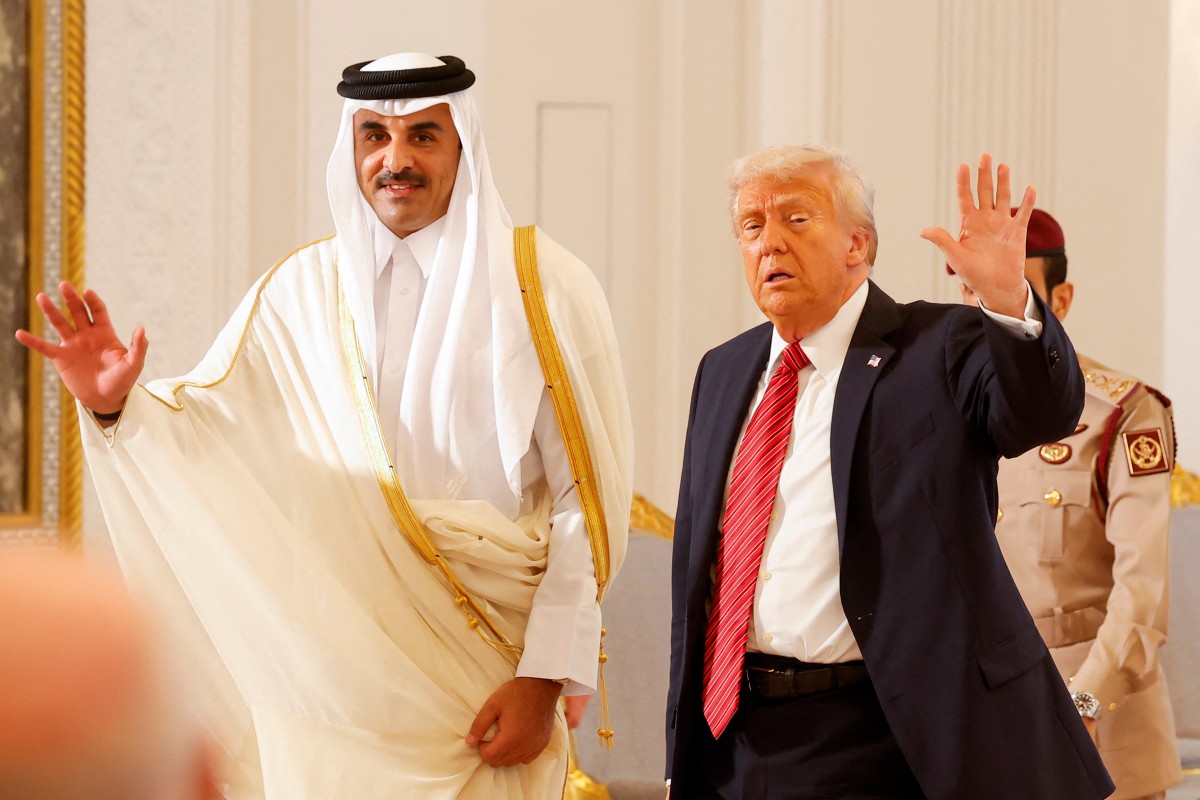Doha, Qatar – US President Donald Trump landed in Doha Wednesday after visiting Riyadh, where he urged Syria’s president to normalise with Israel after offering a major boost to the war-ravaged country by vowing to lift sanctions.
Turkey and Saudi Arabia had both advocated reconciliation with Syria, but the move is the latest to put Trump at odds with Israel, which has expressed deep scepticism of Sharaa and ramped up its military strikes against Syria to degrade its longtime adversary’s military capabilities.
When asked if Sharaa said he’d join the Abraham Accords and normalise relations with Israel, Trump said: “I told him, I hope you’re going to join once you’re straightened out and he said yes. But they have a lot of work to do.”
Trump also asked Sharaa to deport Palestinian militants and tell foreign fighters to leave the country, as well as to take control of camps for captured Islamic State group fighters, currently run by Kurdish forces opposed by Turkey, the White House said.
Biggest applause
Syria’s foreign ministry hailed the meeting as “historic”, but did not mention the Abraham Accords. State media also did not mention normalisation.
The ministry said the leaders discussed “avenues for Syrian-American partnership in counterterrorism efforts” and the importance of lifting sanctions and supporting reconstruction.
After the longer-than-expected half-hour meeting, Trump said the Assad-era sanctions had been “really crippling”.
“It’s not going to be easy anyway, so it gives them a good, strong chance, and it was my honour to do so,” Trump said, addressing Gulf Arab leaders.
The former reality television host, always attuned to crowd sizes, took note of the rapturous reception when he announced the decision at a Riyadh investment forum Tuesday.
“That was the thing that got the biggest applause from the room. We had a very crowded room with thousands of people,” Trump said.
After the announcement, Syrians celebrated in cities across the country overnight.
“These sanctions were imposed on Assad, but… now that Syria has been liberated, there will be a positive impact on industry, it’ll boost the economy and encourage people to return,” said soap factory owner Zain al-Jabali, 54, in Aleppo.
Washington imposed sweeping restrictions on financial transactions with Syria during the brutal civil war and made clear it would use sanctions to punish anyone involved in reconstruction so long as Assad remained in power without accountability for atrocities.
Trump gave no indication that the United States would remove Syria from its blacklist of state sponsors of terrorism — a designation dating back to 1979 over support to Palestinian militants that severely impedes investment.
Qatar plane controversy
A senior envoy of the Joe Biden administration met Sharaa in Damascus in December and called for commitments, including on the protection of minorities.
In recent weeks, Syria has seen a series of bloody attacks on minority groups, including Alawites — the sect of the largely secular Assad family — and the Druze.
Rabha Seif Allam of the Al-Ahram Center for Political and Strategic Studies in Cairo said easing US sanctions would help reintegrate Syria with the global economy by allowing bank transfers from investors and from millions of Syrians who fled during the civil war.
“Lifting sanctions will give Syria a real opportunity to receive the funding needed to revive the economy, impose central state authority and launch reconstruction projects with clear Gulf support,” she said.
Trump touched down at Hamad International Airport in Doha on Wednesday afternoon, where he was met by Qatar’s Emir Sheikh Tamim bin Hamad Al-Thani.
The president later boasted that Qatar Airways had placed a “record” order worth more than $200 billion in jet sales as he signed a raft of deals.
“It’s over $200 billion but 160 in terms of the jets. That’s fantastic. So that’s a record,” Trump said, adding: “It’s the largest order of jets in the history of Boeing. That’s pretty good.”
Qatar has stirred controversy by offering a $400 million luxury aircraft to serve as a new Air Force One and then go to Trump’s personal use.
The move raises major constitutional and ethical questions — as well as security concerns about a foreign power donating the ultra-sensitive presidential jet.








